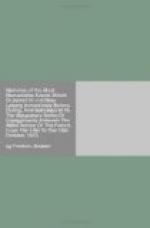Thus the so long feared and yet wished-for hour was at length arrived. What we should never have expected after the 2nd of May, namely, to see a single Prussian again at Leipzig, was nevertheless come to pass. They had then left us as friends, and, by their exemplary conduct, had acquired our highest respect. We bore them, as well as the Russians, in the most honourable remembrance. They now appeared as enemies, whose duty had imposed on them the task of storming the city. Our sons and brothers had fought against them. What might not be our fate? We had not forgotten that which befell Luebeck, seven years before, under similar circumstances. But they were the warriors of Alexander, Francis, Frederic William, and Charles John; terrible as destroying angels to the foe, kind and generous to the defenceless citizen. As far as the author’s knowledge extends, not a man was guilty of the smallest excess within our walls. They even paid in specie for bread, tobacco, and brandy. The suburbs, indeed, fared not quite so well. There many an inhabitant suffered severely; but how was it possible for the commanders to be present every where, and to prevent all irregularities, after a conflict which had raged in every corner of the city? Would you compare the victors, upon the whole, with our late friends and protectors, go through all Saxony, and then judge in whose favour the parallel must be drawn.
It was half past one o’clock when the allies penetrated into the city. The artillery had been but little used on this occasion, and in the interior of the place not at all. Had not the allies shewn so much tenderness for the town, they might have spared the sacrifice of some hundreds of their brave soldiers. They employed infantry in the assault, that the city might not be utterly destroyed. The grand work was now nearly accomplished. Obstinately as the French in general defended themselves, they were, nevertheless, unable to withstand the iron masses of their assailants. They were overthrown in all quarters, and driven out of the place. The streets, especially in the suburbs, were strewed with dead. The writer often counted eight in a very small space. In about an hour you might venture abroad without danger in all parts of the town. But what sights now met the eye! Leipzig, including the suburbs, cannot occupy an area of much less than one (German) square mile. In this extent there was scarcely a spot not covered with houses but bore evidence of the sanguinary conflict. The ground was covered with carcasses, and the horses were particularly numerous. The nearer you approached to the Ranstaedt gate, the thicker lay the dead bodies. The Ranstaedt causeway, which is crossed by what is called the Muehlgraben (mill-dam), exhibited a spectacle peculiarly horrid. Men and horses were every where to be seen; driven into the water, they had found their grave in it, and projected in hideous groups above its surface. Here the storming columns from all the gates, guided




